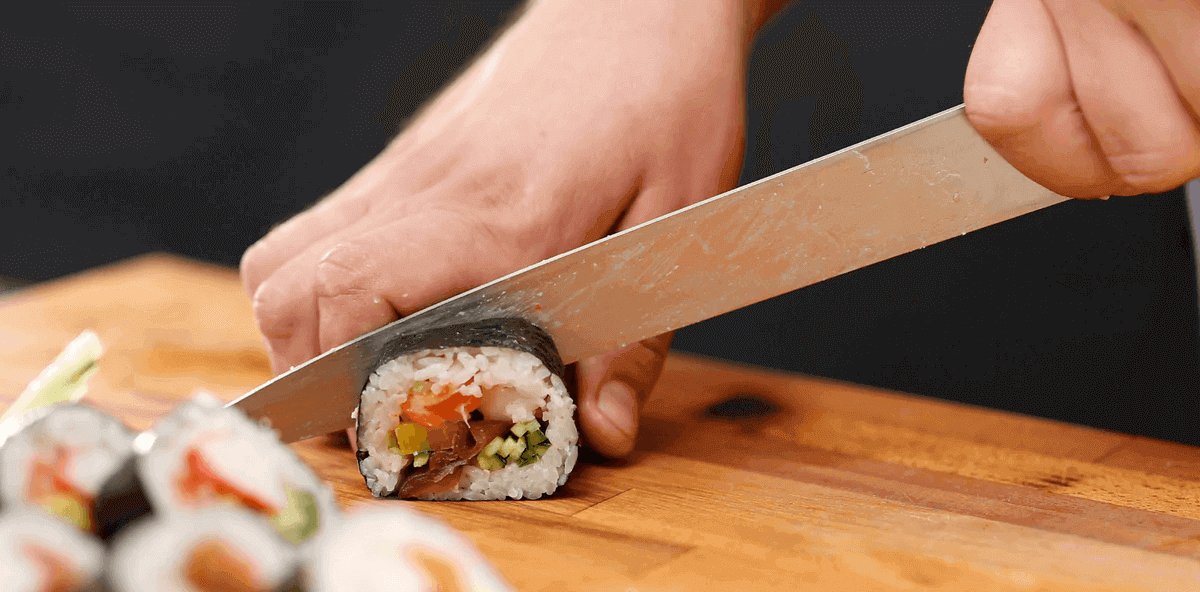Everything you need to know about Damascus knives
Want to buy professional knives? Choose a Damascus knife : strong and sharp steel, unique aesthetics... The Damascus blade is very popular with professionals and knife enthusiasts.
What is a Damascus knife? It is a knife with a Damascus blade made of ultra-strong and solid steel. Damascus steel is a steel that is composed of several layers forged together. It cuts meat, vegetables, fish with perfection. You just have to choose the right knife.
Wondering if the damascus knife is the right choice, we have written a blog post to reveal the benefits about it: Why choose a damascus knife?
It has many advantages:
-
It has a very refined aesthetic. The designs are very original and stand out from other traditional knives.
-
There is a bit of carbon on the damascus blade. It settles on the blade when it is heated and comes into contact with the fire. This helps make it very hard.
-
It is a very sharp knife. That is why top chefs, cooks and demanding individuals love it.
-
The blade is very strong because of the imperfections in the steel distributed across the blade.
In total, there are two different techniques for making a Damascus knife.
What is Damascus steel?
Damascus steel knives are made of two or more different steels. Originally, Damascus steel blades were produced in the regions of India and Uzbekistan. At that time, craftsmen used an Indian steel called wootz, which had a high carbon content, which could vary. These blades were used in particular for bladed weapons and swords. The production of Damascus steel began in 300 BC and continued until the late 1750s.
Following the exhaustion of wootz, the craftsmanship was lost. It was not until the beginning of the 19th century that European blacksmiths began to take an interest in this artisanal manufacturing technique again. In 1823, a certain “Bréant” discovered a new manufacturing process that combined wootz and wrought iron. Damascus steel is also called Damascus steel and Damascus steel. Be careful, this should not be confused with Damascened steel.
Artisanal forging technique:
It consists of assembling different steels (usually 2 or 3). They will then be welded in the fire using hammering, in order to obtain a united block. The blacksmith then puts this block back in the fire, in order to be able to stretch it and fold it on itself. It is then re-welded. These different operations can be repeated endlessly. They allow the blacksmith to create hundreds of layers and thus to create astonishing patterns, which give all its originality to the Damascus steel blade.
Industrial Damascus Steel:
Damascus steel is also manufactured industrially. In order to reduce the manufacturing cost of Damascus steel knives – and therefore the purchase price at the same time – manufacturers use stainless steel. On these industrial knives, the patterns are only a decoration. In addition, these are more minimalist patterns than those made by blacksmiths. Indeed, the blade is composed of a single layer of steel, which does not allow for complex shapes.
You may also notice that the damask of industrial knives ends before the edge. However, industrial damask knives have some advantages. Once you have polished the knife , you will no longer have to worry about its maintenance. In addition, it has no defects and its purchase price is very attractive, unlike knives from artisanal manufacturing techniques, which can cost several hundred euros.
The advantages of Damascus steel blade
First of all, it is an original and unique knife, appreciated by lovers of beautiful knives. The patterns of Damascus steel are so original, that they are more considered a work of art. The manufacturing techniques of Damascus steel are also unique.
The Damascus steel blade allows the knife to be more resistant. In fact, the imperfections of the steel are distributed throughout the blade, in order to weaken them and thus create a much more resistant blade.
Another advantage of the Damascus blade is the presence of carbon due to the brazier, in which the blade is heated. It will make the steel of the blade harder. Indeed, it absorbs the carbon and distributes it over the entire blade when the cutler folds the steel. Damascus is also appreciated for the sharpness of its blade. Knives with Damascus steel blades have an incomparable cutting quality! This is why Damascus steel is found on many knife models.
Damascus Steel Knives
Thanks to its very good resistance, a hard blade and an exceptional sharpness, Damascus steel has been adapted to many knives, other than daggers and swords. Now, you can find outdoor knives in Damascus steel, including hunting knives. You will also find kitchen knives with Damascus steel blades, as well as Japanese kitchen knives. You can also find katanas and pocket knives at cutlery specialists.
In order to give a more luxurious and original style, some models of straight razors have a Damascus steel blade. You too, fall in love now with our selection of knives with Damascus steel blades.
Two or three different steels are assembled and then welded in the fire. As soon as the blacksmith obtains a united block, he puts it back in the fire to be able to better handle it, stretch it and especially fold it. These actions are repeated several times until the blacksmith obtains what he wants. It is thanks to these repeated actions that we end up obtaining original patterns and a Damascus steel blade that will have a quality edge.
The best known of all due to its practicality and versatility remains without a doubt the Santoku knife .







Lamb Pesto Recipe Yum!
Our best recipes to face the fall!